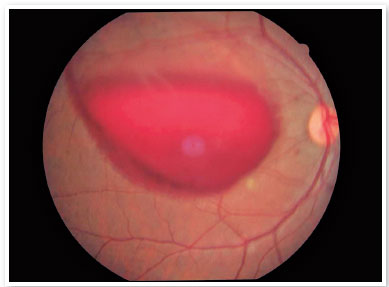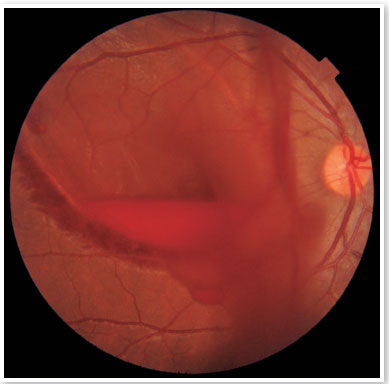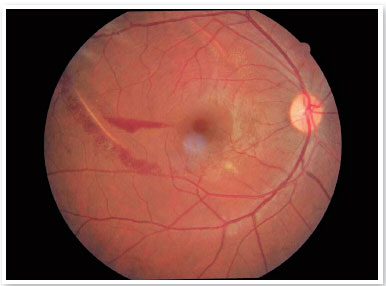Ana Catharina Pinho Costa; Daniel D’Carlos Gonçalves
DOI: 10.17545/eOftalmo/2023.0012
ABSTRACT
We report the case of a 26-year-old man who presented with sudden low visual acuity in the right eye after experiencing a motorcycle accident. He was diagnosed with subhyaloid hemorrhage involving the macula, which evolved with rapid and significant improvement after treatment with yttrium aluminum garnet (YAG) laser hyaloidotomy. It is known that preretinal hemorrhage in the macular region causes a sudden and intense decrease in visual acuity and leads to retinal toxicity. Thus, if the hemorrhage lasts for a long time, the chances of permanent changes in visual acuity increase. YAG laser hyaloidotomy allows for rapid resolution of bleeding, thereby offering a better prognosis.
Keywords: Eye; Retina; Retinal hemorrhage; Laser.
RESUMO
Relato de caso de paciente de 26 anos, do sexo masculino, com queixa de baixa acuidade visual súbita em olho direito após queda de motocicleta, recebeu diagnóstico de hemorragia subhialoidea com acometimento da mácula e evoluiu com rápida e expressiva melhora após tratamento com hialoidotomia com YAG laser. A hemorragia pré-retiniana em região macular provoca queda súbita e intensa da acuidade visual e gera toxicidade na retina. Dessa forma, caso tenha longa duração, aumenta as chances de alterações permanentes. A hialoidotomia com YAG laser é um tratamento que permite rápida resolução da hemorragia, o que confere melhor prognóstico.
Palavras-chave: Olho; Retina; Hemorragia retiniana; Laser.
A subhyaloid preretinal hemorrhage occurs between the internal limiting membrane of the retina and the hyaloid face. This condition can occur after trauma or a Valsalva maneuver and is associated with a sudden and intense loss of visual acuity when it affects the macula. This report aims to discuss the case of a patient who exhibited satisfactory improvement in visual acuity after subhyaloid hemorrhage treatment with yttrium aluminum garnet (YAG) laser hyaloidotomy.
A 26-year-old man with no comorbidities presented at the ophthalmology department of our institution with sudden and intense low visual acuity in the right eye after a motorcycle accident that occurred 3 days before the eye examination. He did not report any history of ocular or cranioencephalic trauma. On examination, he had corrected visual acuity of counting fingers at 1 meter in the right eye and 20/20 in the left eye, and there were no changes in the examination of the anterior segment of both eyes. Based on the findings of tonometry, he had an intraocular pressure of 12 mmHg in both eyes. We performed retinal mapping, which revealed the following in the right eye: transparent media, applied retina, pink papillae, physiological excavation, subhyaloidal hemorrhage in the macula, vessels with normal caliber and pathway, and periphery without ruptures (Figure 1). Furthermore, retinal mapping of the left eye revealed transparent media, applied retina, pink papillae, physiological excavation, intact macula, vessels with normal caliber and pathway, and periphery without ruptures. Hence, the patient was diagnosed with preretinal hemorrhage in the right eye secondary to direct trauma or Vasalva maneuver associated with trauma. Notably, as patient works as a driver, he needed quick recovery of his binocular vision; hence, we decided to perform YAG laser hyaloidotomy. After 15 days of treatment, his condition progressed with rapid and significant improvement in visual acuity of 20/20 in both eyes with and without optical correction (Figures 2 and 3).



Although most cases of subhyaloid hemorrhage resolve spontaneously, the recovery process can take weeks or months and can result in permanent visual impairment owing to the toxicity caused by the contact of the blood with the retina. YAG laser hyaloidotomy and pars plana vitrectomy are among the therapeutic options reported for the condition. The choice of treatment depends on various factors, such as the extent of hemorrhage, bilaterality, the need for rapid recovery of vision, and the risks associated with surgery. YAG laser hyaloidotomy allows for rapid resolution of the hemorrhage, which provides a better prognosis and may be indicated for patients who require rapid recovery of visual acuity.
REFERENCES
1. Khadka D, Bhandari S, Bajimaya S, Thapa R, Paudyal G, Pradhan E. Nd: YAG laser hyaloidotomy in the management of Premacular Subhyaloid Hemorrhage. BMC Ophthalmol. 2016 Apr 18;16:41.
2. Rennie CA, Newman DK, Snead MP, Flanagan DW. Nd: YAG laser treatment for premacular subhyaloid haemorrhage Eye (Lond). 2001 Aug;15 (Pt 4): 519-24.
3. De Maeyer K, Van Ginderdeuren R, Postelmans L, Stalmans P, Van Calster J. Sub-inner limiting membrane haemorrhage: causes and treatment with vitrectomy. Br J Ophthalmol. 2007;91(7):869-72.
4. Lavezzo MM, Zacharias LC, Takahashi WY. Hemorragia submembrana limitante interna em paciente após Valsalva: relato de caso. Arq Bras Oftalmol. 2012;75(6):436-8.
5. Moreira Jr CA, Vianello SMP, Cardillo JA. Retinopatia de Valsalva: intervir ou não? Relato de caso com avaliação por OCT. e-Oftalmo.CBO: Rev Dig Oftalmol. 2015;1(1):1-2.


Funding: No specific financial support was available for this study.
Conflict of interest: None of the authors have any potential conflict of interest to disclose.